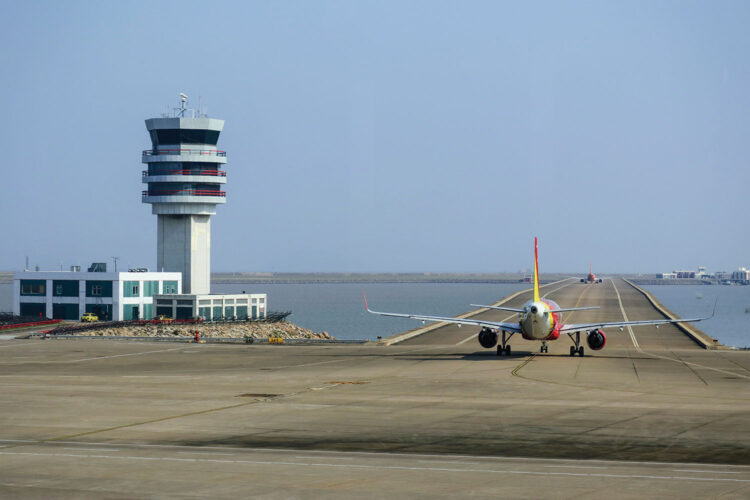Air Macau’s 28-year monopoly concession is set to come to an end, with the Macau government announcing it will open up the market to competition at the end of the year. What does this mean for the competitiveness of Macau?

Macau is looking to establish itself as a World Centre of Tourism and Leisure, but has been criticized for the low capacity of, and lack of flights to and from, Macau International Airport (MIA), making it difficult to achieve the government’s goal of attracting more foreign visitation.
Comparing figures before the outbreak of COVID-19, there were a total of 73,594 flight movements per year at MIA in 2019, of which 29,542 flights (40%) were to and from foreign countries – those being places other than mainland China, Hong Kong and Taiwan.
In order to enhance its competitiveness, the Civil Aviation Authority of Macau (CAA) recently confirmed it would end the monopoly concession held by Air Macau at the end of 2023 and open MIA to competition.

Air Macau was granted a lengthy 25-year concession back in 1995 but was informed in 2019 that its monopoly would expire in 2020. This saw a number of airlines, such as Air Asia, express interest in setting up headquarters in Macau to expand their aviation business before the pandemic gave Air Macau a reprieve via an extra three years on its lone concession.
Now the CAA is pushing ahead with plans to liberalize the industry, including the introduction of a new Civil Aviation Bill. The Bill, already approved by the Legislative Assembly, provides for authorities to grant new 25-year licenses by way of public tender, with an order from the Chief Executive to determine how many licenses can be awarded.
“Lifting the freedom of air can enhance the competitiveness of airline markets and would provide space to adjust the price of flight tickets,” said Legislator Lam U Tou, although he suggests a common-sense approach to which routes might be added.
“The position of the airport in Macau should focus on East-Asian airlines but not long-distance flights, because Hong Kong International Airport (HKIA) or other airports in Guangdong Province are much more attractive than Macau,” Lam explained.

The opening of the Hong Kong-Zhuhai-Macau Bridge in October 2018 has cut travel time between HKIA and Macau to around one hour. HKIA also saw 419,795 flight movements in 2019 – almost six times more than MIA.
“It is unrealistic to carry long-distance flights in Macau civil aviation markets based on the capacity of visitors at Macau’s airport,” Lam said. “It is better to pursue co-operations with airports in Hong Kong and the Pearl River Delta region.”
Adds David Green, founder of Newpage Consulting and a former advisor to the Macau government, “The move to liberalize the airline concession is long overdue. Zhuhai and Hong Kong have been busy expanding their capacity while Macau has procrastinated.
“With Guangzhou and Shenzhen having also focused on enhancing their terminal, runway and ground handling facilities, one could be excused for thinking that Macau cannot play in that same company. Time will tell, but it is clear that further delay will only serve to damage any aspirations for the successful exploitation of new tourist markets, and deeper penetration of existing ones.”
Macau has been home to some other airlines in the past. In 2006, the SAR government divided the aviation franchise of Air Macau, granting Viva Macau and Golden Dragon Airlines sub-concession agreements and Macau Asia Express a joint concession with Air Macau.
Viva Macau once operated flights between Macau, Sydney and Melbourne, but all three airlines collapsed within four years due to financial problems.

In 2018, sources claimed that Turkish Airlines and Qatar Airways had plans to open direct flights to Macau, although these plans were never realized. To date, both Turkish Airlines and Qatar Airways only provide cargo routes to and from Macau.
“If you look at London in the United Kingdom, there are many airports surrounding London which survive by coordinating development,” Lam said.
“It is the same as Macau’s airport. The cooperation with airports between Macau and its neighboring cities is more suitable for Macau’s long-term development and expansion of its passengers.”
Says Green, “Air Macau seemed to be a largely overlooked vestige of the unnatural monopolies created by way of exclusive concessions in Macau during its Portuguese colonial era. As casino liberalization did for visitation and government revenue, one might expect the demise of the Air Macau concession to mean greater and more affordable seat capacity, new carriers, more routes, and new energy devoted to building sustainable air links to under-developed tourist source markets.
“It may also confirm the need for, and feasibility of, an expansion of the existing airport, particularly by way of an additional runway capable of taking the largest passenger planes, and make easier the task of funding any such development.”

























